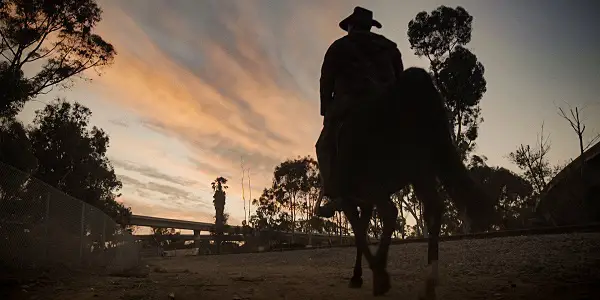When we think of Compton, we have preconceived ideas of the fashion, the music, and the sports that symbolise the city. Caps, hip-hop, basketball. Furthermore, an antipathetic media has largely portrayed Compton only as a violent, gang-ridden place despite an enormous drop in the crime rate over the last thirty years. Fire on the Hill disrupts our understanding of the area with an eye-opening look at an intriguing, underrepresented part of the city – the Compton Cowboys.

Brett Fallentine’s documentary opens with images distinctive of the American frontier: a train, a silhouette of a cowboy, riding a horse, all existing in undisturbed nature. The silhouette is clearly of an African-American man, who begins his story by relaying that, as a child, he never felt like a cowboy – he felt like the kind of person the cowboys wanted to kill or even be. His perception was never simply about black and white cowboys, it was about those who were right versus those who were wrong, alluding to this moral belief as a method to better serve the community of Compton.
The cowboy rides into a tunnel and an expertly executed tracking shot via drone raises the camera into the view of modernity – big buildings, busy highways, and little else to suggest that the essence of the Old West has been preserved in any way.
A lesser known history
In the stables of a small unincorporated area known as ‘the Hill’, however, the spirit lives on. The characters who inhabit this space include Calvin, a formerly aspiring vet who found a group of rider friends and eventually got himself a horse, and Ghuan, an ex-serviceman who sees the Hill Stables as an escape from the gangs of South Central. Ghuan shares a memory of witnessing the fall of the Berlin wall, dreaming for a similar destruction of ideology to happen on his home turf too.
The Compton Cowboys’ spectral lineage is the black cowboys from the South who rode up to California in the early 20th century. Their influence is ingrained in this training ground, according to Ghuan. Regarding his positive social intentions for the Hill, he succinctly says to his fellow riders, “I don’t have the answer but I know y’all are the answers.” Both Calvin and Ghuan have fascinating perspectives with varying reasons for their passion for the cowboy lifestyle, whether it’s personal happiness or to make the world better. For Chris Bird, on the other hand, there’s the aspect of competition.
Also from Compton, Chris is introduced at the Roadrunner Rodeo in Arizona as possibly the only non-white participant. The budding talent in his rookie year competing in the professional rodeo circuit in order to qualify for the National Finals Rodeo. Over 5300 riders compete and only 15 can make it to the NFR.
Black men in a white world
Bucking stereotypes with his image, Chris opts to briefly discuss a sadly familiar story of a youth that entails his brother and an uncle getting shot and a police raid of his house that led to the family staying in a hotel for a year or two. Race and identity are certainly prominent and perception is a killer. But all colours of cowboy know how hard it is to be a great competitor, so generally Chris is treated with respect and without presumption.
Fallentine has a trio of compelling stories to work with, so much so that technique can take a back seat. However, he further illuminates their illuminating journeys with amazing cinematography that can be best described as reminiscent of the cinematic camera mode in the other great recent work of Western art – Red Dead Redemption 2.
The title comes from the fourth character of the film, which is the horse stable itself. We learn of the sad chapter in the Hill’s history when a tumultuous fire burnt it to the ground. The objective for these cowboys – and, in turn, this documentary about them – is to help restore the stable to its great former self.
Fire on the Hill: Conclusion
Fire on the Hill is an inspiring journey of building, rebuilding and reinforcing a community for the black community in Compton, away from the Bloods and Crips and other notorious factions that gave the city a dark reputation. The Hill stands for creating something different yet easily accessible, making a change for the positive when nobody else is doing it. Likewise, Fallentine achieves the same goals with his documentary just by sharing the story.
What are your favourite Western films that deviate from the norm? Let us know in the comments below!
Fire on the Hill is currently seeking distribution in the USA and UK. For more information regarding screenings and release, click on the film’s website here.
Does content like this matter to you?
Become a Member and support film journalism. Unlock access to all of Film Inquiry`s great articles. Join a community of like-minded readers who are passionate about cinema - get access to our private members Network, give back to independent filmmakers, and more.